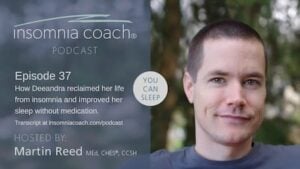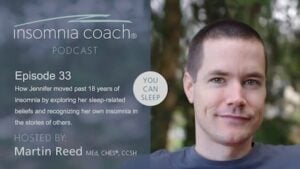How Deeandra reclaimed her life from insomnia and got her sleep back on track without medication (#37)
Deeandra used to sleep well until a stressful time in her life caused her to go without sleep for 48 hours, causing anxiety. She worried that she had lost the ability to sleep and tried different medications, but they didn’t work well and had side effects. For three years, Deeandra tried different rituals and experiments to sleep better, putting her life on hold.
Gradually, Deeandra learned to let go of control and not avoid wakefulness at night. She only went to bed when she was actually sleepy, and started living her life regardless of how she slept at night. She resumed activities she had withdrawn from and even started exercising again. Over time, she reclaimed her life from insomnia, and her sleep improved.
Now, Deeandra sleeps for an average of six to seven hours a night, and even though she still has difficult nights, they no longer control her life. In her own words, “life is about the time we spend awake, not the time that we sleep”.










